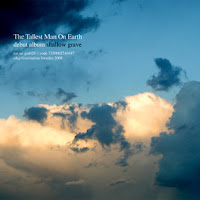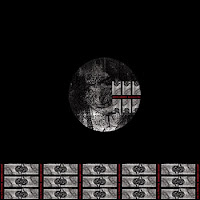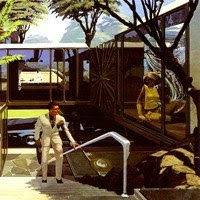>
By far the very best black metal album of 2008. While mainstream media talk about Darkthrone and Satyricon, I don’t even consider that stuff black metal anymore. Darkthrone is a joke and Satyricon is just some ordinary slick metal that’s got nothing to do with black metal whatsoever.
Mgła comes forth with the most astonishing piece of work in a long time. The monotony, the guitar lines and the perfect drum play along with the classic black metal-voice is simply a beautiful work of art. Ever since their appearance on the Crushing The Holy Trinity compilation back in 2005 Mgła have definitely proven themselves worthy time and time again, and with Groza they reach perfection. In my opinion, this is the true essence of black metal.
Hail to Poland!
Between the grey pillars of conscience the path to truth narrows.
Standpoints are chosen over general reason.
 Earth
Earth –
The Bees Made Honey In The Lion’s Skull LP
This is probably the record that defines 2008 for me. It contains all the moody darkness and shady light that represent the worst year in my life. I love this album. Twin Peaks goes Americana on a desert plain in the middle of nowhere, into the wild, no country for old men, and so forth… The desolate soundscapes are so majestic it’s almost surreal. Soothing stuff for a fucked up mind that works best when reading Cormac McCarthy’s The Road.
Read the interview I did with Dylan Carlson earlier this year.
The darkness is always present in Thomas Ekelund’s music, sort of David Lynch-like, Jan Švankmajer-esque. But with Thomas’ music there’s always that human touch: if you feel too scared to continue, just reach out and he’s there like a shoulder, like a ghost, to lean on. At least that’s how I feel when listening to this black mass of isolation, insecurity and determination. The will to power as expressed through the art of the diseased. The nature of the beast.
Lost In Reflections, along with the additional 7” single that completes the package, is beyond doubt his master’s voice, his masterpiece if you like. It’s an incredible album that should touch souls if the bearer of that soul is up to the task of recieving such mindmelting audio. Beyond all darkness there is light, though. It’s bleak and unpleasantly cold and damp, but its warmth equals survival.
Alongside the Earth and the Mgła albums, this one is definitely the album of the year.
Ok, this also fits the title Album of The Year perfectly. Extreme scene hype on this one, but do believe it. This is where the new school kids on the block have sex with the old school farts from back in the early ’80’s. Folky drones meet with psychedelic prog vibes as the industrial dark ambience flows through the veins of Lucifer and digs deep into the murky ass of some lowlife white trash farmer on crack – and strikes gold! I don’t know what the hell I’m talking about here, but check this out. It’ll slay yo mama.

Ofermod –Tiamtü LP
Ah yes, this invokes the spirit of old Dissection, the slow brooding parts of Deathspell Omega and eternal darkness, death and delirium… The spirit! The opening lines – In an abyss of uncreation… – come as classic as Triumphator’s Flesh be gone! and Watain’s Show me the face of uttermost madness!, sung with vocals just as persuasive as those of Arioch on the Salvation album. Far from Ariochs insanity, but equally determined and hateful. The vocals are right up there in the mix and that’s the way it should be.
At first I thought this was quite an anonymous album, but Tiamtü slowly builds, comes creeping and infects your feeble mind. The guitar harmonies and arrangements are memorable, heavy and majestic, almost filmic at times, otherwordly, and the production is perfect: not too clean, not too powerful, not too sloppy… Just perfect.
Slay them! So dead…

Brainbombs – Fucking Mess LP
This is seriously good. If there’s a hype regarding this album – fuck it! This is beyond the cliché and tragedy of newcomer posers. Read the article and deify.

Woven Hand – Ten Stones CD
Damn, a lot of the albums on this list are like ”well, not as good as the previous one, but still damn good!” and that’s what I think about Ten Stones as well. Mosaic (2006) is sooo amazingly good, which makes Ten Stones only sooo good. But that’s obviously good enough. This Christian freak (who thinks he’s a Native American?) is a genius. Worship Him!

Witch – Paralyzed LP
Not all at the kind of dark magical gem that made their debut album so fantastic, but still well worth your attention. Once you get passed the fact that this doesn’t sound very much like the debut it’ll grow and rise to heights you thought didn’t existed. Well, not really, but kind of. Knowing that J Mascis, God of all, sits behind that fat bass drum should be enough information to get you going.

U.S. Christmas – Eat The Low Dogs CD
Dark, psychedelic, mindbending spacerock blues. Their gig at the Roadburn festival next year will hopefully be a killer. If my back hasn’t let me down by the time they play I will stage dive into infinity when they let loose The Scalphunters. Maybe.

Portishead –Third CD
I am a huge fan of Dummy and have been listening to that record at least once a year since its release in 1994. The vibe reminds me of Public Enemy’s unbeatable feat Fear of A Black Planet, packing layers upon layers, hauling roughneck beats and dirty tricks. Third is not that much of a genre defining trip hop album as the debut, in fact there’s not much trip hop at all on this one. Third simply represents thrilling, modern, experimental pop music in a league of its own.
It was made available on last.fm at first, free for everybody to enjoy a week before the actual album release. Brilliant move! In just under 24 hours approximately 327,000 listeners went online to listen to the album. This is the new deal.
On a sidenote, speaking of Public Enemy, Wikipedia states that On May 29, 2008 Portishead’s Geoff Barrow realized a “boyhood fantasy” when Chuck D of Public Enemy joined the band onstage at the Primavera Sound festival in Barcelona. He contributed a freestyle rap over Portishead’s single ‘Machine Gun’”.

V/A – Höga Nord LP
I got this LP yesterday and just by looking at it, checking the participating artists, I knew it would be on this list. Bocksholm (Peter Andersson and Peter Andersson, of Deutsch Nepal and Raison d’Être respectively, two of the best constellations from the early Cold Meat Industry period), Dusa (creator of the absolutely stunning Ljung LP), Niellerade Fallibilisthorstar (after hearing only two of their songs last year I ordered everything they had put out at the time) and Vårtgård represents the sounds of the Swedish countryside – and the countryside of industrial music is very much alive, as you’ll hear on this stunning album. Because this is music that breathes. This is what Amish industrial would sound like if it ever existed. As expected, Dusa totally dominates this album, although all four acts bring very high quality stuff. Segerhuva should’ve reserved some space for Ättestupa as well, then this LP would have been a statement that nobody would want to fuck with, not even the Wu-Tang Clan. Nevertheless, it is a statement that will cause tremors throughout the world of stalemate noise posers, that’s for sure.
The only song that comes even close to classic industrial/noise is Finkhällen by Vårtgård. Bocksholmens Bögamord might bear some minor resemblance to old Deutsch Nepal, but the rest of the songs are unique soundscapes that totally stand their ground. Thus, Segerhuva is not the “noise only” label you thought it was. Hoorah!
Highly recommended!

Arckanum – Antikosmos CD
The best Arckanum material so far. His previous releases are good, but the rather weak production is quite irritating at times. Antikosmos doesn’t have that problem. The production is thick and powerful as the album is recorded in the classic Sunlight Studios and mastered by Necromorbus. As always, the trademark vocals sound like those of a fifteen year old, and I wouldn’t have it any other way. Unfortunately I don’t understand the lyrics at all, but knowing that Shamaatae is totally dedicated to the cause I bet it’s perfectly genuine stuff.
I could do without the Blóta Loka track, though.

Erik Enocksson – With Its Dark Tail Curled ’Round The Garage CD
Amazing. And so very underground. I feared Erik would turn mainstream after the success of Farväl Falkenberg (one of the best Swedish albums, as well as one of the best Swedish films), but fortunately it’s the other way around. This album will irritate people.

V/A – White Nights TAPE
In all honesty I haven’t had the time to listen to this 4TAPE-BOX yet (got it a couple of hours ago), but there is no doubt in my mind that this is a total freakout of a killer fucking onslaught against all senses. Alfarmania, Ochu, Proiekt Hat, Sewer Election, Tape Dekay, Trepaneringsritualen, Treriksröset and Vårtgård… That’s top notch warfare right there!
Early in 2008 the eight present here received one copy each of the so called Death Tape from Jonestown. They were given total freedom to do whatever they wanted with the cassette as long as it became 15 minutes worth of sounds. This is what they did.
I don’t think the misspelling of ”Nights” on the cover is intentional, but somehow it suits this massive compilation perfectly. It should be filthy. This is not corporate.
Limited to 100 copies.

Robedoor – Shrine To The Possessor LP

Dystopia – LP

Esbjörn Svensson Trio – Leucocyte CD

Dr Dooom – Dr Dooom 2 CD

The Tallest Man On Earth – Shallow Grave CD

Skullflower – Desire For A Holy War CD

Melvins – Nude With Boots LP

Bonnie Prince Billy – Lie Down In The Light CD

Grand Magus – Iron Will LP

Jason Crumer – Burning In Hell LP

Mogwai – The Hawk Is Howling LP

Ufomammut – Idolum LP

Opeth – Watershed CD

Bohren Und Der Club of Gore – Dolores CD

Haare – Chemical Witchcraft LP

Massgrav – This War Will Be Won By Meat Eaters CD

Moss – Sub Templum LP

Mob 47 – Dom ljuger igen 7″

Nick Cave – Dig, Lazarus, Dig!!! CD

Asva – What You Don’t Know Is Frontier LP

Krisiun – Southern Storm CD

PVMNTSW – Förintelsens elfenbensportar 3″CD

Black Mountain – In The Future LP

Javelina – CD

Jex Thoth – CD (Read the interview)

Portrait – LP

Erykah Badu – New Amerykah… CD

Titiyo – Hidden CD

Coldworker – Rotting Paradise CD

Meshuggah – ObZen CD

Danava – UnonoU LP

Jarl – Tunnel Vision / Mind Reaper TAPE

White – Tormented TAPE
Reissues:

Blod – Red Light Companion 3LP
Holy macaroni! This 3LP-BOX is a monster! From the Segerhuva site:
All in all, this box stands as a monument to the heavy noise genius of Jesper Forselius and his BLOD. Hailed by harsh noise fanatics over the world, Blod’s music is a unique offering of perverse singlemindedness shaped into sick monolithic slabs of noise.
The liner notes written by Taint are just as sick and disturbing as the music. In other words, a complete package for the mentally deranged that crushes just about everything you thought you knew about noise, morals and sexuality. Apparently the Segerhuva posse spent about 40,000 SEK on this release which adds yet another dimension to the sickness.
I love it!

RJF – Greater Success in Apprehension & Convictions CD
Originally released in 1983, this is experimental industrial at its very best. As Segerhuva puts it: …this is a sinister reminder that something was alive back then, something that is missing now.

Sabu Martinez – Burned Sugar (The Swedish Radio Recordings 1973) LP
This is proof that funk was not invented in the U.S., it was invented in Jönköping! Just listen to the drums of maestro Stefan Möller (The Spotnicks) and submit. Musically Burned Sugar appeals to fans of funk, jazz, fusion, krautrock, extreme prog and filthy freak out bursting blasts from outer space, as stated on the Mellotronen webpage. Couldn’t agree more.
And of course there is a lot of stuff I haven’t heard yet that probably will kick some kind of ass as well, stuff from Wolfbrigade, Uncurbed, Avskum, Victims, World Burns To Death, Bong, Coffins, Leafes… The list goes on. But hey, there are roughly 50 albums on this list for you to check out (and I probably forgot some), so I hope you find something new!
Now… I just got a Spotify account, so let’s see how many of these albums are available there…
Disappointments:
I had high hopes for these albums, but no… They turned out to be major disappointments. I have to give them a few more spins before I give them away, though.
Leif Edling – Songs of Torment – Songs of Joy CD
The Devil’s Blood – Come Reap EP
Anna Ternheim – Leaving On A Mayday CD

































































